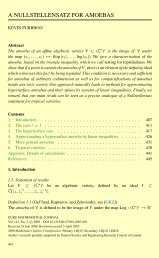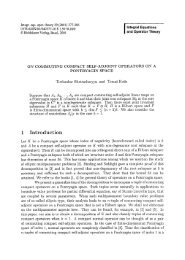Молодой учёный
Молодой учёный
Молодой учёный
Create successful ePaper yourself
Turn your PDF publications into a flip-book with our unique Google optimized e-Paper software.
342 Государство и право<br />
«<strong>Молодой</strong> <strong>учёный</strong>» . № 5 (40) . Май, 2012 г.<br />
period from 3 to 5 years for the unlawful use of a trademark<br />
on the prior agreement of parties.<br />
At present criminalization of the consumer market makes<br />
questions of responsibility for production and sale of adulterated<br />
and counterfeit products urgent (especially excisable<br />
like spirits, etc.). At this stage the legislative framework<br />
and adopted by the State penal measures are ineffective and<br />
require revision. Simplification of the work of legal entities<br />
due to the reduction of planned inspections by State control<br />
to one time in three years (except for tax control), limits the<br />
possibility of controlling authorities to monitor adulterated<br />
and counterfeit products. The abolition of compulsory certification<br />
of consumer products also complicates the situation.<br />
To save time, effort and money in the process of creating<br />
a mechanism for the effective management and protection of<br />
the consumer market we should refer to foreign experience<br />
in this area.<br />
Returning to the problem of rare inspections of legal entities<br />
in Russia, it should be noted that in Germany controlling<br />
authorities decide themselves how often they will carry<br />
out inspections. The regularity of inspections depends on the<br />
type and origin of products, practices of internal company<br />
control, health, education and quality of personnel, previous<br />
record of violations. When there is information about possible<br />
violations the checks over and above the plan are carried<br />
out [3, p.47].<br />
It should be emphasized that the European Union (EU)<br />
monitors the quality of products though the Food and Veterinary<br />
Service of the Directorate General for Health and Consumer<br />
Protection, which is guided by EU directives on health<br />
and consumer protection. Its tasks include among other matters<br />
control over compliance with the Union directives in the<br />
field of food quality in the EU and in the Third World countries,<br />
supplying EU markets with their products. In Russian<br />
conditions, the protection of consumer interests in terms of<br />
quality of goods, the range of products, prices and saturation<br />
of the market with the goods is entrusted to the Department<br />
of Consumer market and Services in Moscow and similar<br />
agencies in the regions. However, this department is unable<br />
to control the importation of counterfeit goods, which led to<br />
its saturation (35%) in Moscow market. The situation ended<br />
up with a fact that check of each product requires permission.<br />
German society for quality control and research institutes<br />
studying the market from Mainz provides information for<br />
consumers about the quality of the goods. The federal government<br />
helps to publish the journal «Test» which informs<br />
the consumers about new products, examines the quality, offers<br />
alternative products to compare, reports the indicative<br />
prices, and gives advice to consumers [4, p.64]. In Russia<br />
these functions are executed by publications of the Union of<br />
Consumers of the Russian Federation and to a lesser extent –<br />
the TV program «Test Purchases», «Habitat» and others.<br />
Also in Germany there is a practice when the enterprises<br />
of provisions area have special journal where you can find all<br />
information about the deal like the time and the place and the<br />
price etc. Such a system allows analyzing the supply chain,<br />
identifying the direct perpetrators and thus preventing further<br />
movement of defective products.<br />
One of the main forms of State regulation of foreign consumer<br />
market is price regulation when the public authorities<br />
undertake pricing for specific types of goods and services that<br />
are crucial to the national economy. From 5 to 10% of the<br />
consumer prices in the United States are regulated. Herewith<br />
direct regulation is limited – only in monopolized industries<br />
under antitrust laws. The most extensively used<br />
methods of indirect price regulation such as regulation of the<br />
discount rate of the Federal Reserve Banks are the reduction<br />
of government deficits, large-scale purchases of goods and<br />
services for federal purposes with fixed prices, tax incentives<br />
for consumption and sales. There are approximately 20% of<br />
prices controlled by State in France and 10% in Spain. A<br />
wide-range price control makes the market less flexible, inhibits<br />
the growth of production, restrains competition, and<br />
limits the intersectoral mobility of capital. However, the limited<br />
State regulation of prices takes place in all countries with<br />
developed market economies.<br />
The selective credit policy is a very significant trend in the<br />
sphere of State regulation of consumer market. Credit support<br />
can be obtained both by sellers of consumer goods and<br />
consumers (in case of expensive, but necessary purchase).<br />
When credit privileges are not enough the measures of direct<br />
subsidies to consumers may be applied to increase demand.<br />
Taxation methods are widely used in developed countries<br />
for consumer markets regulation. In particular, in the most<br />
countries essential goods are imposed by taxes to a lesser extent<br />
and luxury goods, alcohol and tobacco products carry<br />
the main tax burden.<br />
Different public organizations have a large impact on<br />
consumer markets along with public authorities in countries<br />
with developed market economies. In the majority of developed<br />
countries there are large national organizations of consumers<br />
such as Consumers Union in the USA, British Association<br />
of Consumers, and National Institute for Consumers<br />
in France.<br />
The legislation is being improved under the influence<br />
of public organizations. Strict standards of environmental<br />
safety, quality of goods and services are being developed.<br />
Consumers Unions conduct an independent examination of<br />
goods and services, educate consumers, interact with legislators,<br />
manufacturers, conduct public opinion and consumer<br />
preferences polls, publish reference and technical literature,<br />
provide citizens with necessary legal assistance. Two public<br />
organizations in Russia are Consumers Union of the Russian<br />
Federation and the National Foundation of Consumer<br />
Protection.<br />
Thus, at this moment in Russia the basis for effective<br />
functioning of consumer market is developed but not in detail.<br />
There is no single conceptual legitimate approach to<br />
regulate and protect the relations arising in the market. The<br />
task to speed the completion of the formation of a legislative<br />
package regulating economic relations should be put forward<br />
as a top priority. We should also take into consideration

















